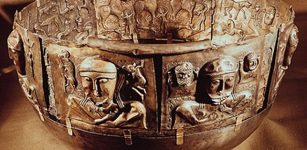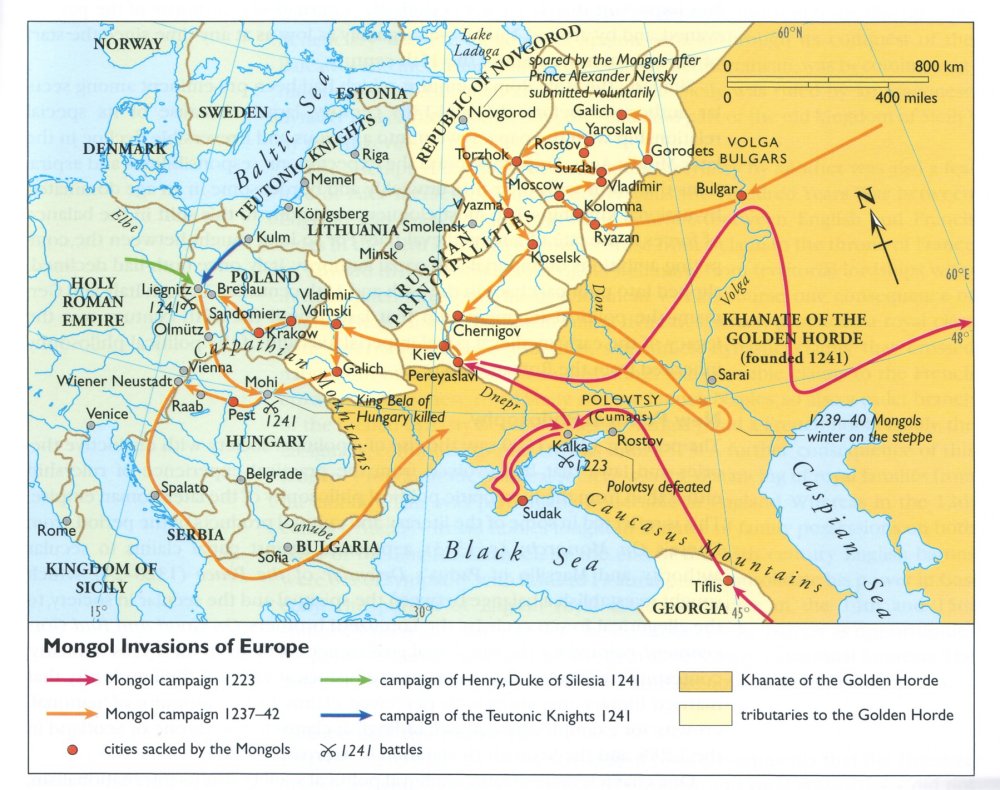Something Unexpected Stopped Mongol Hordes From Conquering Europe
Ellen Lloyd - AncientPages.com - In the 13th century, Europe was shivering with fear. The Mongol invasion was just around the corner.
When Genghis Khan, the great Mongol conqueror, died in 1227, he left his son, Ögedei Khan, a territory that extended from northeast China to the Caspian Sea, just north of modern-day Iran.
Ancient Mongol warriors. Credit: Adobe Stock - serikbaib
Ögedei Khan carried out his father’s legacy and continued the expansion of the Mongol empire. His forces expanded to the east and west, conquering the remainder of northwest China and pushing into Russia.
In 1240 Kiev had been sacked, and the Mongol horde was rapidly advancing west. The situation in Europe was not looking good, and everyone feared the Mongols’ approach.
Mongols had already plundered Russia and Baltic countries, and rumors circulated the cruel invaders were now about to enter the heart of Europe. Poland, Hungary, and the Czech Republic started to prepare for the worst.
In December of 1241, Ögedei Khan died unexpectedly. Ögedei Khan had granted permission to invade the remainder of Europe, all the way to the "Great Sea", the Atlantic Ocean, but his death prevented the invasions from continuing west.
What happened next has always been somewhat of a historical mystery. Some historians have argued that Batu Khan, who commanded the Mongol invasion after the death of Ögedei Khan, turned back toward the Mongol capital of Karakorum for the election of a new leader.
However, Batu Khan never returned to Mongolia. Instead, he stayed in southern Russia to rule the Golden Horde.
New findings from Princeton University researchers cast a new light on why the Mongol invasion of Europe failed. Scientists say the bloodthirsty Mongol horde was stopped by weather that prevented their forces from raids on European cities.
Researchers have sampled wood from five regions of Eurasia to track what the weather was like during the period and found they discovered the climate in Hungary and its surroundings were unusually cold and wet for about three years, from 1238 to 1241.
The extra moisture and early spring thaw turned the Hungarian plains into marshes and swampland. The Mongolians found themselves in unsuitable terrain for moving the thousands of horses the armies relied on for transportation and warfare.
Is it possible weather conditions stopped a strong Mongolian army? Some historians argue climate change was not enough to stop the army from entering Europe. It was a significant factor that saved Europe from the Mongols, but the lack of a strong leader was also a contributing factor that stopped the planned invasion.
Ögedei's death in 1241 brought the Mongol invasion of Europe to a premature end.
It was not until 1255, well into the reign of Möngke Khan, that Batu felt secure enough to again prepare to invade Europe. Fortunately for the Europeans, he died before his plans could be implemented.
Updated on December 20, 2022
Written By Ellen Lloyd - AncientPages.com
Copyright © AncientPages.com All rights reserved. This material may not be published, broadcast, rewritten or redistributed in whole or part without the express written permission of AncientPages.com
More From Ancient Pages
-
 Jason And The Argonauts – Hate, Sorcery, Love And Jealousy Reign In This Famous Greek Story
Featured Stories | Jan 6, 2022
Jason And The Argonauts – Hate, Sorcery, Love And Jealousy Reign In This Famous Greek Story
Featured Stories | Jan 6, 2022 -
 Napoleonic Code: Why Was One Of The Most Influential Civil Codes Flawed?
Ancient History Facts | May 16, 2020
Napoleonic Code: Why Was One Of The Most Influential Civil Codes Flawed?
Ancient History Facts | May 16, 2020 -
 Denisovans In The Altai Mountains: A Hominin Group That Interbred With Modern Humans
Evolution | Nov 11, 2024
Denisovans In The Altai Mountains: A Hominin Group That Interbred With Modern Humans
Evolution | Nov 11, 2024 -
 Evolution Of Plague Over Hundreds Of Years In Scandinavia Documented By Scientists
Archaeology | Feb 28, 2023
Evolution Of Plague Over Hundreds Of Years In Scandinavia Documented By Scientists
Archaeology | Feb 28, 2023 -
 The Mystery Of Ancient Ever-Burning Lamps
Ancient Technology | Sep 10, 2024
The Mystery Of Ancient Ever-Burning Lamps
Ancient Technology | Sep 10, 2024 -
 Why Was Europe’s Oldest Battle Fought At Tollense Valley 3,000 Years Ago?
Archaeology | Oct 25, 2024
Why Was Europe’s Oldest Battle Fought At Tollense Valley 3,000 Years Ago?
Archaeology | Oct 25, 2024 -
 King Ur-Nammu – King Of Ur, King Of Sumer And Akkad – The One Who Built The Temple Of God Enlil
Ancient History Facts | Aug 30, 2015
King Ur-Nammu – King Of Ur, King Of Sumer And Akkad – The One Who Built The Temple Of God Enlil
Ancient History Facts | Aug 30, 2015 -
 Mysterious White Chinese May Be Related To Ancient Roman Soldiers – Did Marcus Crassus’ Army Settle Down In The Gobi Desert?
Civilizations | Dec 29, 2017
Mysterious White Chinese May Be Related To Ancient Roman Soldiers – Did Marcus Crassus’ Army Settle Down In The Gobi Desert?
Civilizations | Dec 29, 2017 -
 Ahimsa – Ancient Non-Violence Concept Teaching Compassion And Love Towards All Living Beings
Featured Stories | Jan 2, 2019
Ahimsa – Ancient Non-Violence Concept Teaching Compassion And Love Towards All Living Beings
Featured Stories | Jan 2, 2019 -
 Ominous Black Layer – A Geological Anomaly Or Scientific Evidence Of A Great Ancient Cosmic Catastrophe?
Ancient Mysteries | Jan 29, 2019
Ominous Black Layer – A Geological Anomaly Or Scientific Evidence Of A Great Ancient Cosmic Catastrophe?
Ancient Mysteries | Jan 29, 2019 -
 Gundestrup Cauldron: Great Gilded Silver Vessel Decorated With Scenes Derived From Celtic Mythology
Artifacts | May 30, 2016
Gundestrup Cauldron: Great Gilded Silver Vessel Decorated With Scenes Derived From Celtic Mythology
Artifacts | May 30, 2016 -
 Unexpected Discovery Of Europe’s Oldest Vanilla Pod In Prague Castle – Was It Used For Alchemical Experiments?
Archaeology | Apr 8, 2025
Unexpected Discovery Of Europe’s Oldest Vanilla Pod In Prague Castle – Was It Used For Alchemical Experiments?
Archaeology | Apr 8, 2025 -
 Ginnungagap From Which The World, Gods, Humanity And All Life Emerged In Norse Beliefs
Myths & Legends | Dec 11, 2024
Ginnungagap From Which The World, Gods, Humanity And All Life Emerged In Norse Beliefs
Myths & Legends | Dec 11, 2024 -
 Were Other Humans The First Victims Of The Sixth Mass Extinction?
Evolution | Nov 1, 2023
Were Other Humans The First Victims Of The Sixth Mass Extinction?
Evolution | Nov 1, 2023 -
 Kali – Hindu Goddess Of Death, Fear And Horror Who Destroys Ignorance, Evil And Establishes World Order
Featured Stories | Sep 28, 2021
Kali – Hindu Goddess Of Death, Fear And Horror Who Destroys Ignorance, Evil And Establishes World Order
Featured Stories | Sep 28, 2021 -
 Longest European Burial Mound Pre-Dating The Egyptian Pyramids Discovered In Czechia
Archaeology | Jun 24, 2024
Longest European Burial Mound Pre-Dating The Egyptian Pyramids Discovered In Czechia
Archaeology | Jun 24, 2024 -
 Mystery Of King Solomon’s Temple
Biblical Mysteries | Dec 3, 2018
Mystery Of King Solomon’s Temple
Biblical Mysteries | Dec 3, 2018 -
 Secret History Of The Micmac – The Mysterious Red Earth People
Ancient Mysteries | Jun 22, 2020
Secret History Of The Micmac – The Mysterious Red Earth People
Ancient Mysteries | Jun 22, 2020 -
 Horrible Ancient Massacre On The Island Of Chios Led To Greek Independence
Featured Stories | Jun 29, 2018
Horrible Ancient Massacre On The Island Of Chios Led To Greek Independence
Featured Stories | Jun 29, 2018 -
 Bulgarian Archaeologists Find Nearly 3000 Coins In Clay Pot At Sofia Dig
News | Sep 8, 2015
Bulgarian Archaeologists Find Nearly 3000 Coins In Clay Pot At Sofia Dig
News | Sep 8, 2015


